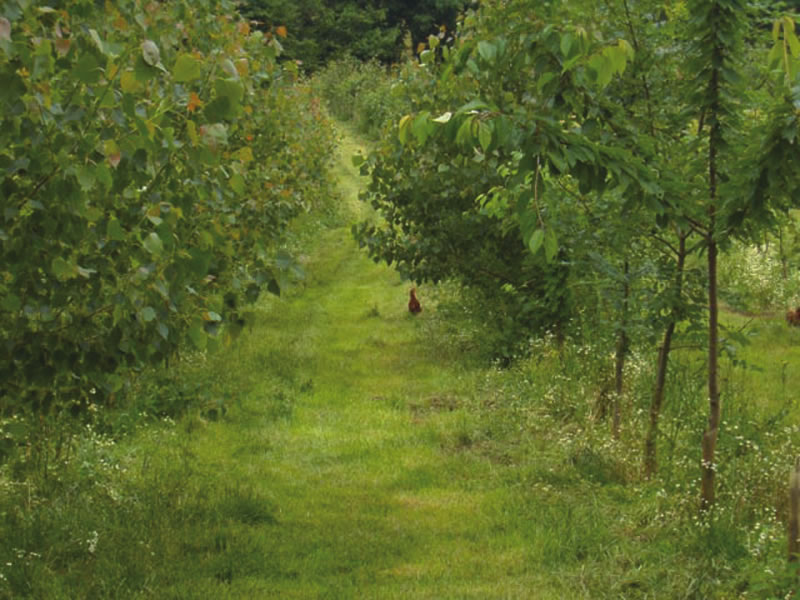
Free range egg producer John Widdowson said he was proud of the part he had played in the creation of the Woodland egg brand, after figures showed that it had now passed the two billion mark.
The Woodland Trust and Sainsbury’s announced that more than two billion Woodland eggs had now been sold since the brand was launched in 2004. John Widdowson, a member of the British Free Range Egg Producers’ Association who came up with the idea for a Woodland brand and developed it with his packer, Noble Foods, said the announcement was “brilliant news.”
He said, “It is a hugely successful brand and I am very proud of the part I played in it.” Woodland eggs, which have been sold through Sainsbury’s stores since the brand’s launch in 2004, are promoted as eggs from hens that are free to roam and forage in woodland and the supermarket group openly credits John Widdowson as the person responsible for the idea.
Sainsbury’s says it was John who observed that his hens preferred the shade and protection of trees. The supermarket says that this behaviour stems from the fact that the hen was descended from jungle fowl and their natural instinct was to shelter under trees and protect themselves from predators. “It just stands to reason, really,” said John, who said that other producers before him had looked to increase overhead cover for laying birds but said that he was amongst the first to do so on such a large scale.
“It was a case of trying to encourage the birds to range more,” said John. “The best ranging birds are the best flocks. The birds produce better when they range better so it makes sense to look at ways to encourage birds to range.”
John said that before Woodland eggs, the free range sector had concentrated more on conditions for birds inside the sheds. “Rightly so,” said John. “Producers were having to make sure that the conditions met the requirements of Freedom Food and others. But then I felt we needed to look at what was happening outside. I thought too few birds were ranging and I looked at ways to get them ranging more because you can see that birds that do range maintain better condition and they perform better.”
John said that flightless birds felt vulnerable in open spaces. It only needed a crow or buzzard to fly overhead and hens would run for safety. Providing cover enabled the birds to feel more secure in ranging away from the shed. “It’s a no-brainer,” said John. “It was so obvious what needed to be done.”
He said that at the time he took the idea to Noble Foods, there were not too many brands in the egg sector. That had changed today, he said, but back in 2004 there were few around and he felt the Woodland egg was something that could establish itself in the market. Sainsbury’s took up the brand and forged a link with the Woodland Trust so that one pence from every pack of 12 Woodland eggs goes towards planting new trees. The success of the brand has helped the Woodland Trust to raise more than £3.5 million and plant more than two million trees. The trust says the Woodland brand has been “brilliant” in supporting its work.
The brand has since expanded to include, chicken, turkey, apples and honey – all providing money to fund new planting schemes, although Woodland eggs are still the biggest earner for the trust. The relationship forged through Woodland eggs has also led to Sainsbury’s becoming involved in other trust projects.
John Widdowson’s association, BFREPA, has become involved with the Woodland Trust by working with the trust to produce a leaflet entitled, ‘The role of trees in free range poultry farming.’ BFREPA says that free range egg producers have planted more than a million trees over the last few years to improve the habitat of their birds. The benefits of tree cover have now become well established.
One BFREPA member who has invested heavily in tree planting is David Brass at the Lakes Free Range Egg Company in Cumbria. He has planted more than 40,000 trees on his land, creating more than 15 hectares of woodland, and he has quantified the financial benefit to be gained from tree planting. He says that a farm with 64,000 hens could make an additional £20,000 per year as a result of improved egg production and quality. He says his tree planting cost £2,000 per hectare, but says the farm achieved payback in just six months.
Karl Mitchell, director of fundraising at the Woodland Trust described the partnership developed with Sainsbury’s as a result of Woodland eggs as "fantastic."
He said, "It has evolved tremendously from the sales of eggs and other produce to Sainsbury’s backing us on some of our biggest projects, including our Jubilee Woods project and First World War Centenary Woods Project. Celebrating ten years together is a tremendous achievement. Sainsbury’s backing is helping us to plant millions of trees to benefit all ages – bringing huge benefits to schools and communities, woodland and wildlife. Here at the Woodland Trust we want to say a big thank-you to Sainsbury’s”
Mike Coupe, CEO at Sainsbury’s said, “As well as choosing our high welfare Woodland products, our customers know they’re also playing a part in a great cause that we’ve supported for 10 years.”
Judith Batchelar, Sainsbury’s brand director, said, “It’s a natural fit – everyone benefits, including our customers, our farmers and their livestock.”
Sainsbury’s says that 400 of its farmers have been advised on tree planting and maintenance, one million trees planted have been planted on woodland farms and 750,000 trees have gone to schools through its “Active Kids” programme.
